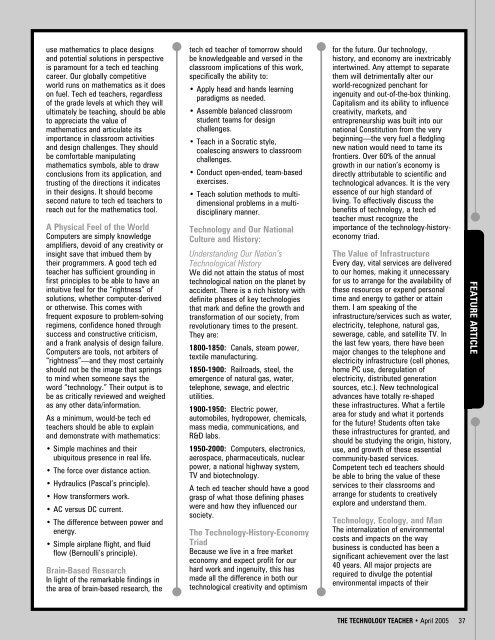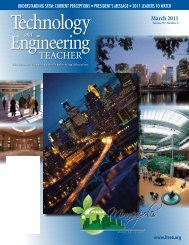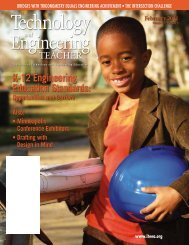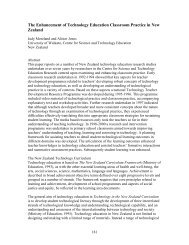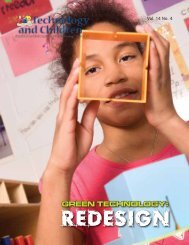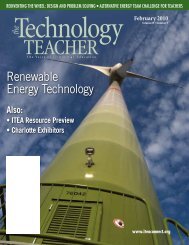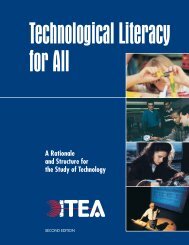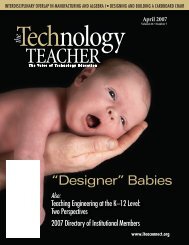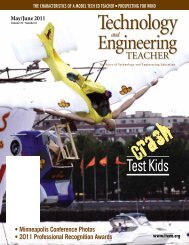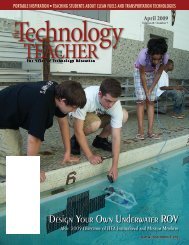Teaching Elements and Principles of Bridge Design - International ...
Teaching Elements and Principles of Bridge Design - International ...
Teaching Elements and Principles of Bridge Design - International ...
You also want an ePaper? Increase the reach of your titles
YUMPU automatically turns print PDFs into web optimized ePapers that Google loves.
FEATURE ARTICLE<br />
use mathematics to place designs<br />
<strong>and</strong> potential solutions in perspective<br />
is paramount for a tech ed teaching<br />
career. Our globally competitive<br />
world runs on mathematics as it does<br />
on fuel. Tech ed teachers, regardless<br />
<strong>of</strong> the grade levels at which they will<br />
ultimately be teaching, should be able<br />
to appreciate the value <strong>of</strong><br />
mathematics <strong>and</strong> articulate its<br />
importance in classroom activities<br />
<strong>and</strong> design challenges. They should<br />
be comfortable manipulating<br />
mathematics symbols, able to draw<br />
conclusions from its application, <strong>and</strong><br />
trusting <strong>of</strong> the directions it indicates<br />
in their designs. It should become<br />
second nature to tech ed teachers to<br />
reach out for the mathematics tool.<br />
A Physical Feel <strong>of</strong> the World<br />
Computers are simply knowledge<br />
amplifiers, devoid <strong>of</strong> any creativity or<br />
insight save that imbued them by<br />
their programmers. A good tech ed<br />
teacher has sufficient grounding in<br />
first principles to be able to have an<br />
intuitive feel for the “rightness” <strong>of</strong><br />
solutions, whether computer-derived<br />
or otherwise. This comes with<br />
frequent exposure to problem-solving<br />
regimens, confidence honed through<br />
success <strong>and</strong> constructive criticism,<br />
<strong>and</strong> a frank analysis <strong>of</strong> design failure.<br />
Computers are tools, not arbiters <strong>of</strong><br />
“rightness”—<strong>and</strong> they most certainly<br />
should not be the image that springs<br />
to mind when someone says the<br />
word “technology.” Their output is to<br />
be as critically reviewed <strong>and</strong> weighed<br />
as any other data/information.<br />
As a minimum, would-be tech ed<br />
teachers should be able to explain<br />
<strong>and</strong> demonstrate with mathematics:<br />
• Simple machines <strong>and</strong> their<br />
ubiquitous presence in real life.<br />
• The force over distance action.<br />
• Hydraulics (Pascal’s principle).<br />
• How transformers work.<br />
• AC versus DC current.<br />
• The difference between power <strong>and</strong><br />
energy.<br />
• Simple airplane flight, <strong>and</strong> fluid<br />
flow (Bernoulli’s principle).<br />
Brain-Based Research<br />
In light <strong>of</strong> the remarkable findings in<br />
the area <strong>of</strong> brain-based research, the<br />
tech ed teacher <strong>of</strong> tomorrow should<br />
be knowledgeable <strong>and</strong> versed in the<br />
classroom implications <strong>of</strong> this work,<br />
specifically the ability to:<br />
• Apply head <strong>and</strong> h<strong>and</strong>s learning<br />
paradigms as needed.<br />
• Assemble balanced classroom<br />
student teams for design<br />
challenges.<br />
• Teach in a Socratic style,<br />
coalescing answers to classroom<br />
challenges.<br />
• Conduct open-ended, team-based<br />
exercises.<br />
• Teach solution methods to multidimensional<br />
problems in a multidisciplinary<br />
manner.<br />
Technology <strong>and</strong> Our National<br />
Culture <strong>and</strong> History:<br />
Underst<strong>and</strong>ing Our Nation’s<br />
Technological History<br />
We did not attain the status <strong>of</strong> most<br />
technological nation on the planet by<br />
accident. There is a rich history with<br />
definite phases <strong>of</strong> key technologies<br />
that mark <strong>and</strong> define the growth <strong>and</strong><br />
transformation <strong>of</strong> our society, from<br />
revolutionary times to the present.<br />
They are:<br />
1800-1850: Canals, steam power,<br />
textile manufacturing.<br />
1850-1900: Railroads, steel, the<br />
emergence <strong>of</strong> natural gas, water,<br />
telephone, sewage, <strong>and</strong> electric<br />
utilities.<br />
1900-1950: Electric power,<br />
automobiles, hydropower, chemicals,<br />
mass media, communications, <strong>and</strong><br />
R&D labs.<br />
1950-2000: Computers, electronics,<br />
aerospace, pharmaceuticals, nuclear<br />
power, a national highway system,<br />
TV <strong>and</strong> biotechnology.<br />
A tech ed teacher should have a good<br />
grasp <strong>of</strong> what those defining phases<br />
were <strong>and</strong> how they influenced our<br />
society.<br />
The Technology-History-Economy<br />
Triad<br />
Because we live in a free market<br />
economy <strong>and</strong> expect pr<strong>of</strong>it for our<br />
hard work <strong>and</strong> ingenuity, this has<br />
made all the difference in both our<br />
technological creativity <strong>and</strong> optimism<br />
for the future. Our technology,<br />
history, <strong>and</strong> economy are inextricably<br />
intertwined. Any attempt to separate<br />
them will detrimentally alter our<br />
world-recognized penchant for<br />
ingenuity <strong>and</strong> out-<strong>of</strong>-the-box thinking.<br />
Capitalism <strong>and</strong> its ability to influence<br />
creativity, markets, <strong>and</strong><br />
entrepreneurship was built into our<br />
national Constitution from the very<br />
beginning—the very fuel a fledgling<br />
new nation would need to tame its<br />
frontiers. Over 60% <strong>of</strong> the annual<br />
growth in our nation’s economy is<br />
directly attributable to scientific <strong>and</strong><br />
technological advances. It is the very<br />
essence <strong>of</strong> our high st<strong>and</strong>ard <strong>of</strong><br />
living. To effectively discuss the<br />
benefits <strong>of</strong> technology, a tech ed<br />
teacher must recognize the<br />
importance <strong>of</strong> the technology-historyeconomy<br />
triad.<br />
The Value <strong>of</strong> Infrastructure<br />
Every day, vital services are delivered<br />
to our homes, making it unnecessary<br />
for us to arrange for the availability <strong>of</strong><br />
these resources or expend personal<br />
time <strong>and</strong> energy to gather or attain<br />
them. I am speaking <strong>of</strong> the<br />
infrastructure/services such as water,<br />
electricity, telephone, natural gas,<br />
sewerage, cable, <strong>and</strong> satellite TV. In<br />
the last few years, there have been<br />
major changes to the telephone <strong>and</strong><br />
electricity infrastructure (cell phones,<br />
home PC use, deregulation <strong>of</strong><br />
electricity, distributed generation<br />
sources, etc.). New technological<br />
advances have totally re-shaped<br />
these infrastructures. What a fertile<br />
area for study <strong>and</strong> what it portends<br />
for the future! Students <strong>of</strong>ten take<br />
these infrastructures for granted, <strong>and</strong><br />
should be studying the origin, history,<br />
use, <strong>and</strong> growth <strong>of</strong> these essential<br />
community-based services.<br />
Competent tech ed teachers should<br />
be able to bring the value <strong>of</strong> these<br />
services to their classrooms <strong>and</strong><br />
arrange for students to creatively<br />
explore <strong>and</strong> underst<strong>and</strong> them.<br />
Technology, Ecology, <strong>and</strong> Man<br />
The internalization <strong>of</strong> environmental<br />
costs <strong>and</strong> impacts on the way<br />
business is conducted has been a<br />
significant achievement over the last<br />
40 years. All major projects are<br />
required to divulge the potential<br />
environmental impacts <strong>of</strong> their<br />
THE TECHNOLOGY TEACHER • April 2005 37


